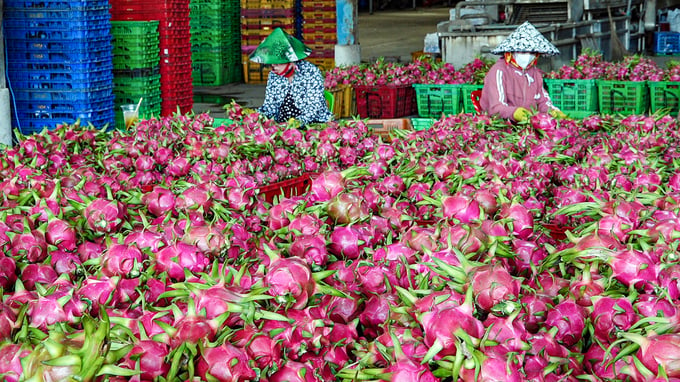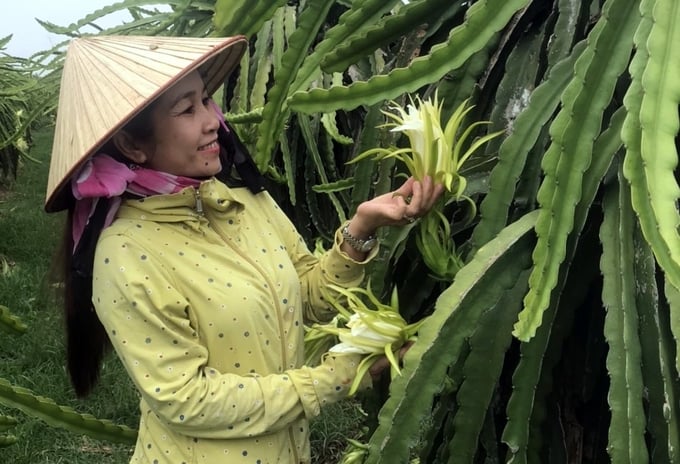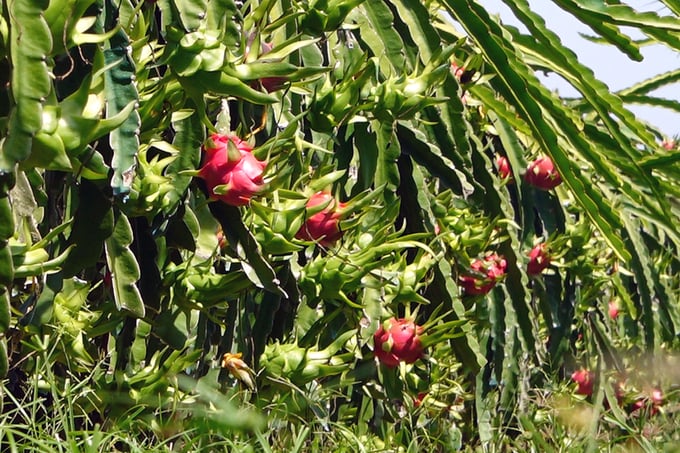May 16, 2025 | 17:23 GMT +7
May 16, 2025 | 17:23 GMT +7
Hotline: 0913.378.918
May 16, 2025 | 17:23 GMT +7
Hotline: 0913.378.918

Recently, the consumption situation of Binh Thuan dragon fruit has been stable. Photo: KS.
Binh Thuan dragon fruit is regarded as a highly competitive agricultural commodity in both domestic and international markets. According to the Binh Thuan Provincial Department of Industry and Trade, dragon fruit official export turnover was anticipated to reach 6.83 million USD in the first ten months of 2023, corresponding to 5,384 tons, an increase of 17.19% in turnover and 1.38% in volume year on year.
Binh Thuan dragon fruit is presently sold to over 20 markets, including China, the Philippines, the Republic of Korea, Singapore, Thailand, Malaysia, Myanmar, Indonesia, Qatar, India, the United Arab Emirates, and Qatar. Germany, the Netherlands, Russia, and Spain are among the European markets. Canada and the United States are examples of American marketplaces. Australia and New Zealand are two marketplaces in Oceania.

Farmers in Binh Thuan excitedly entered the harvest season to produce fruit. Photo: KS.
Bien Tan Tai, Deputy Director of the Binh Thuan Department of Industry and Trade, stated that the Binh Thuan dragon fruit has been registered for geographical indications in Japan. This is the first step in gaining a competitive edge for Binh Thuan dragon fruit shipped to this market.
The combined data from Northern bordering regions for unauthorized export demonstrates that the volume of dragon fruit from the entire country to the Chinese market through border gates has been enormous. Binh Thuan dragon fruit accounts for the lion's share. Between January and October of 2023, over 591,000 tons of dragon fruits worth 340 million USD were exported to the market.
According to Phan Van Tan, Deputy Director of the Department of Agriculture and Rural Development of Binh Thuan, since China opened its market, the price of dragon fruit has stayed consistent and occasionally increased in the first nine months of 2023. Prices for white meat dragon fruit averaged 8-12,000 VND/kg, whereas prices for red flesh dragon fruit varied from 15 to 20,000 VND/kg.
Mr. Huynh Canh, Chairman of the Binh Thuan Dragon Fruit Association, indicated that recent dragon fruit shipments to the Chinese market have gone off without a hitch. Currently, around 100 containers containing dragon fruit (each weighing 20 tons) are sent to the Chinese market on a daily basis. Dragon fruit prices have been consistent in recent months, ranging from 10,000 to 16,000 VND/kg, and this good trend is expected to continue until the end of the year.
Bien Tan Tai, Deputy Director of Binh Thuan's Department of Industry and Trade, added that import-export operations are projected to continue prospering in the last two months of the year, aided by favorable international and domestic conditions. Global economic indices are showing indications of improvement, outperforming predictions. Most international agencies predict that global economic growth in 2023 will exceed original forecasts issued at the start of the year. The export market is progressively improving, and it is expected that demand for commodities would rise over the year-end holiday season. As a result, the forecast for dragon fruit exports in the future time is improving.
According to Mr. Huynh Canh, for smooth dragon fruit exports to the Chinese market, growers and firms must follow the General Administration of Customs of China's standards for planting area codes and packing facilities. Furthermore, focus must be made on establishing methods to manage pests and diseases in orchards, successfully managing dangerous organisms subject to the Chinese market's plant quarantine.

To export dragon fruits to favorable markets, farmers must comply with the regulations required by other countries. Photo: KS.
Mr. Bien Tan Tai believes that, while dragon fruit consumption is expected to increase in the future year, markets such as China and others provide technological challenges, particularly in terms of quality standards, source traceability, and tight food safety management and quarantine rules.
As a result, dragon fruit exporters to the Chinese market, as well as other countries, must pay close attention to food safety considerations, source traceability, label packaging, and concurrently update export standards in accordance with each country's needs. Concurrently, enterprises should focus advanced technological research and application in preservation and processing, stimulate investment in creative and contemporary equipment and production lines, diversify processed goods, and improve deep processing. It is critical to encourage businesses to participate in value-chain relationships with farmers, making the market the focus point for adjusting output to meet the demands of the export market.
Maintaining exports to old markets, developing new markets, and actively understanding and meeting each market's design, quality, and import criteria are critical. To suit the individual requirements of each market, tight supervision over the use of chemicals, stimulants, and growth-promoting agents across the whole dragon fruit production-consumption chain is essential.
Translated by Linh Linh

(VAN) Japan's efforts to lower the price of rice through the release of its stockpile may finally be making some progress, albeit at a snail's pace.

(VAN) U.S. tariffs are not only a 'shock', but also an opportunity for Vietnamese businesses to renew their mindset toward comprehensive development.

(VAN) As Bac Giang lychee enters the harvest season, Minister Do Duc Duy expects that the fruit will contribute greatly to agricultural exports due to standardized production and deep processing.

(VAN) Consumers have shown a preference for free-range eggs, but those farming systems are more vulnerable to biosecurity risks like bird flu.
/2025/05/09/5701-1-184335_301.jpg)
(VAN) Vietnam’s eel exports nearly doubled thanks to a mud-free farming model, opening up new prospects while still facing numerous barriers related to international standards.

(VAN) Minister Do Duc Duy warned that if production is not professionalized and supply chains are not transparent, the U.S. market could become a growth bottleneck.

(VAN) Delegating surveillance responsibilities to local authorities is a cost-saving and efficiency-boosting measure that removes a key bottleneck for enterprises, according to Director General Duong Tat Thang.